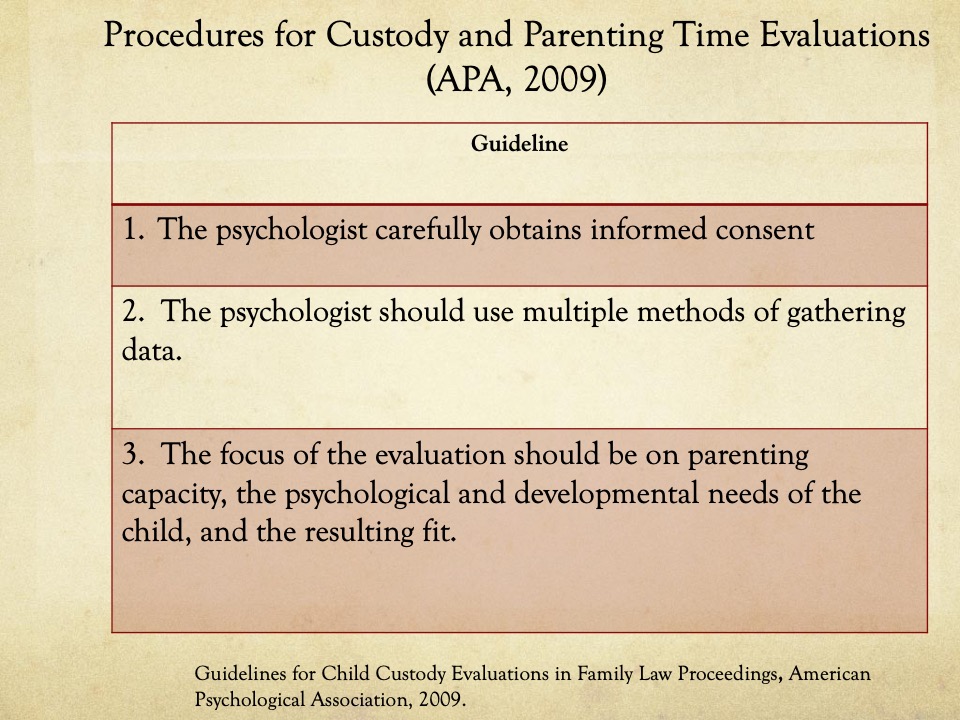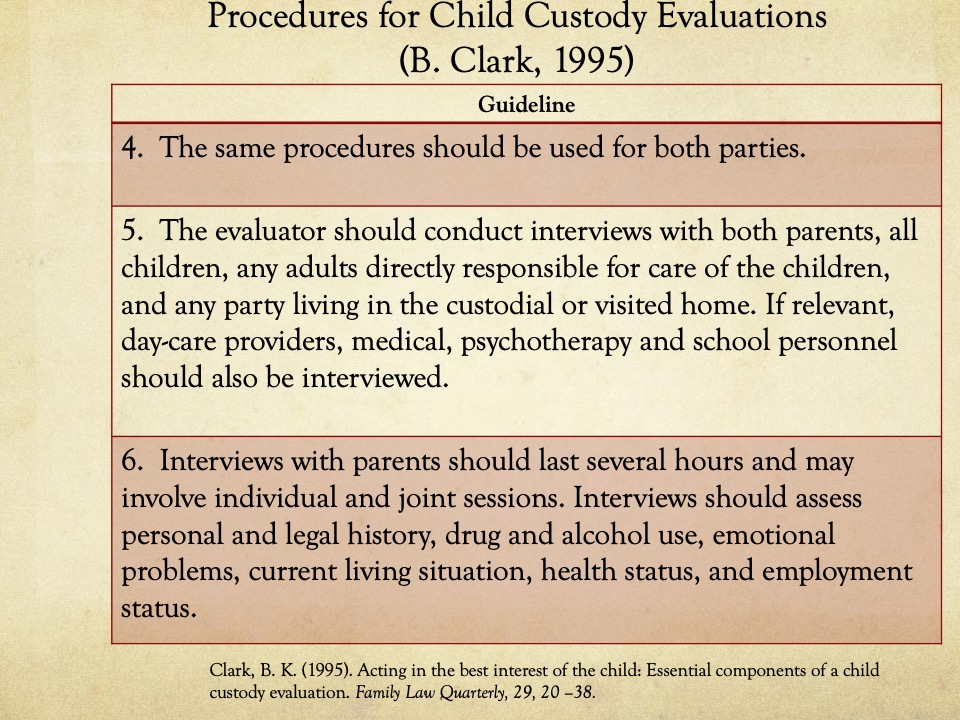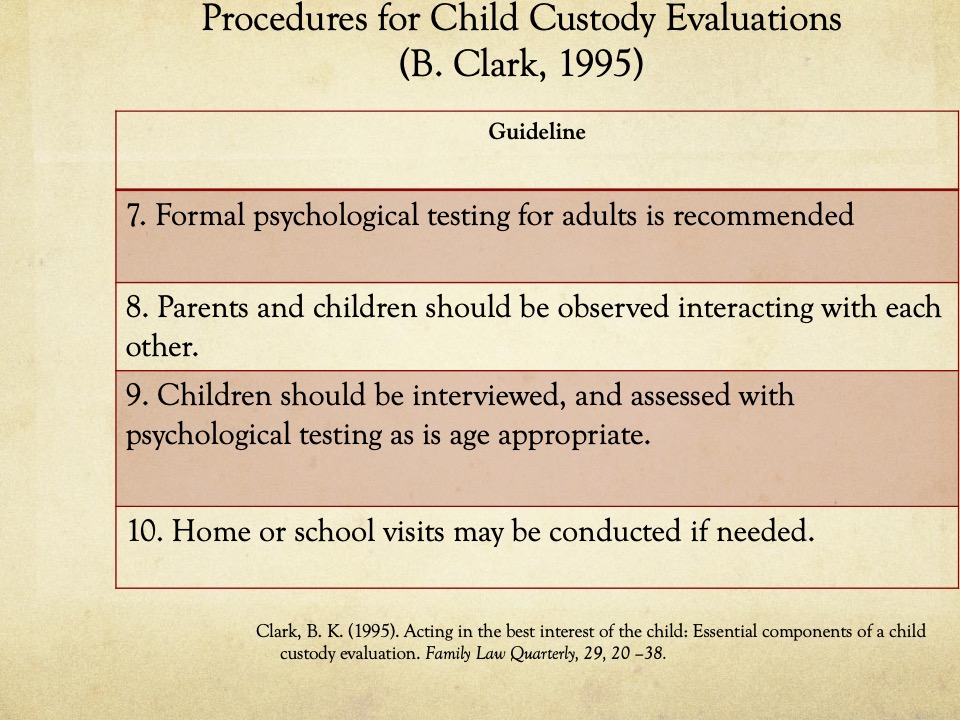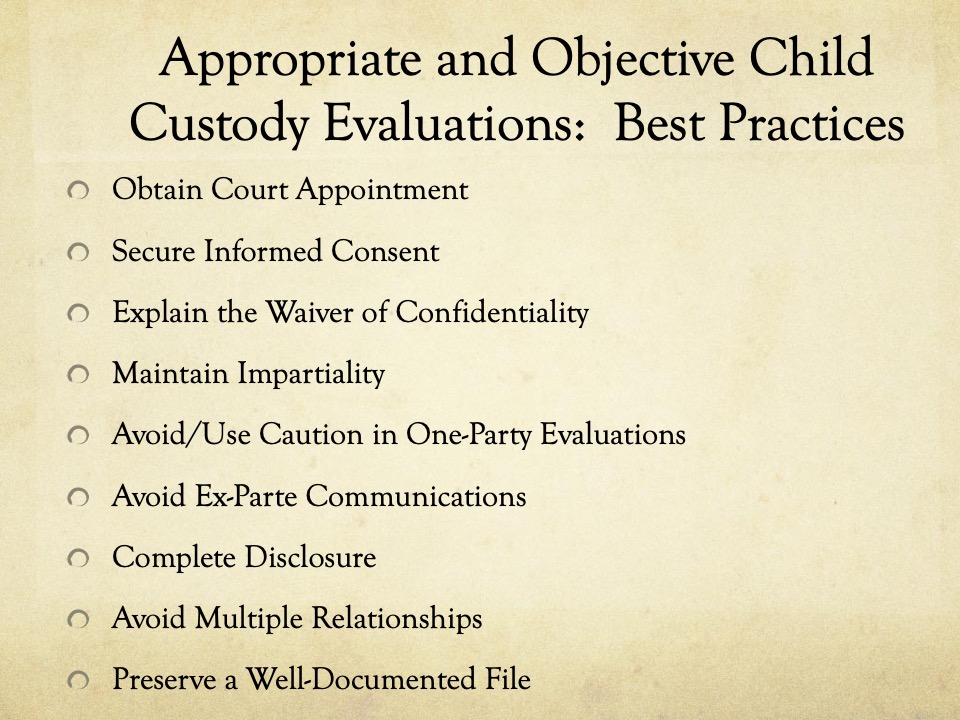WHAT WOULD A FORENSIC PSYCHOLOGIST DO?

- In any forensic case, the patient has to be informed about and consent to the evaluation after a clear and complete explanation of the psychologist’s role and the evaluation procedures:
- who will be assessed, and how?
- what are the potential uses of information?
- who will be privy to results?
- what are the limits to confidentiality?
- what form will results take?
- will the person be able to read/review/receive the report/get feedback on the results of their evaluation?
- who will have control over the data once the report is done?
- how does the person terminate the evaluation (custody evals should be court-ordered),
- who is told about this termination?
- what are the evaluation procedures (what will happen)?
- does the psychologist have consent to interview collaterals, review medical records, etc.?
Adults give consent for children, but children, in my opinion, still need to be informed who will know what they say and how this will be communicated (in writing, in testimony, etc)
2. Multiple evaluation methods are employed: Interviews with parents, contacts with collateral sources, documentation, interviews with children, psychological testing, observations of parties with children. Custody evaluations, when done properly, use a method of convergent validity. No conclusion should be based on only one kind of data, one statement, one test
3. Issues are not simply declaring a winner or loser, but rather considering the contributions of each parent to meeting the children’s needs, and the liabilities brought by each parent in each domain of assessment (best interest factor). This requires a comprehensive evaluation such as does not occur in the context of psychotherapy, or even a brief forensic assessment, especially where only one party is involved.

Beth Clark added the following recommendations for child custody evaluations
4. The same procedures should be used for both parties.
This Is an element of impartiality, and improves the validity of the findings
Dr Z did not perform any evaluation of mom
5. The forensic evaluator should conduct interviews with both parents, all children, any adults directly responsible for care of the children, and any party living in the custodial or visited home. If relevant, day-care providers, medical, psychotherapy and school personnel should also be interviewed.
This is about having complete and adequate data to address the children’s best interests. I would add to item 5 that interviews with the parents should touch upon knowledge about the children, relationships with the children, communication and discipline of the children, involvement on the children’s activities, education and religion, the parents’ capacities to foster a relationship between the children and the other parent, DV, etc.
6. This is about having a comprehensive assessment of each parent, as a person, as a parent, as a responsible, law-abiding citizen.
The specific issue, for example, is not the person’s legal, mental health or substance use history, but about how this impacts, or might in the future impact, parenting of the child or children.

I don’t feel that psychological testing for children is always necessary. It depends on what questions are being asked. Testing is expensive, and often less directly relevant that interview and observation.
So lets go back to case 5:
Which of these guidelines did Dr. Z follow?
NO: Informed consent, with knowledge of the purpose to which the information provided by the father would be used?
NO: Multiple methods for gathering data: psychological testing with multiple instruments, extensive history interview, observation of child and adults together, home visits, careful questioning about parenting capacity, parenting techniques, each party’s ability to mentalize or empathize with their child?
NO: Did she assess each party’s personal and legal history, drug and alcohol use, emotional problems, current living situation, health status, and employment status.
NO: Did she speak with collateral sources of information to assess the parties different claims about what happened in the past?
NO: Did he spend equal amounts of time with the two parties?
If a psychologist is going to make child custody or parenting-time recommendations, the following are best practices:

1.Obtain Court Appointment: The more specific the order the better: 1) scope of evaluation [best interest factors, custody, parenting time], quasi-judicial immunity, releases, deal with hearsay issue, releases, etc. Court appointment allows to advocate for children’s welfare, dueling experts works poorly in family law context
2.Secure Informed Consent: essential to provide participants with a thorough explanation of the process, fees, limits of confidentiality and rules regarding disclosure of records, information, where reports will go
3.Explain the Waiver of Confidentiality: distinction between evaluator and treater; privilege and confidentiality waived.
4.Maintain Impartiality: same procedures for both parties, disclose all information. This is related to Avoiding Ex-Parte Communications
5.Avoid or at least use caution in One-Party Evaluations: Sometimes one is necessary to get the court to consider an issue. But an impartial is often necessary to resolve the issues that you may raise :
1. Psychologists provide an opinion of an individual’s psychological characteristics only after they have conducted an examination of the individual adequate to support their statements and conclusions (Ethics Code 9.01(b)).
2. Greenberg and Shuman “Forensic experts approach their role in a neutral, impartial manner, even when they are retained by one party. “
6. Provide Complete Disclosure:
7. Avoid Multiple Relationships
8. Preserve a Well-Documented File
BIBLIOGRAPHY
Bennett, B., Bricklin, P., Harris, E., Knapp, S., VandeCreek, L., and Younggren, J. (2006) Assessing and managing risk in psychological practice: An individualized approach. Rockville, MD: The Trust.
Bow, J. and Quinell, F. (2001) Psychologists’ current practices and procedures in child custody evaluation. Professional Psychology: Research and Practice, 32, 261-268.
Clark, B. (1995). Acting in the best interest of the child: Essential components of a child custody evaluation. Family Law Quarterly, 29, 20 –38.
Ellis, E. (1990) Should a psychotherapist be compelled to release an adolescent’s treatment records to a parent in a contested custody case? Professional Psychology: Research and Practice, 2009, 40, 557–563.
Garrity, C. and Barris, M. (1994) Caught in the middle: Protecting the children of high-conflict divorce. New York: Lexington Books.
Greenberg, L., Gould, J., Gould-Saltman, D., and Stahl, P. (2003) Is the child’s therapist part of the problem? What judges, attorneys, and mental health professionals need to know about court-related treatment for children. Family Law Quarterly, 39-69.
Greenberg, S., and Shuman, D. (1997) Irreconcilable conflict between therapeutic and forensic roles . Professional Psychology: Research and Practice, 28, 50-57.
Johnston, J. & Campbell, L. (1999) Impasses of Divorce: The Dynamics and Resolution of Family Conflict. New York: Free Press.
Johnston, J., Roseby, V., & Kuehnle, K. (2009) In the Name of the Child: A Developmental Approach to Understanding and Helping Children of Conflicted and Violent Divorce (Second Edition) New York: Springer.
Kelly, J. and Johnston, J. (2001) The alienated child: A reformulation of Parental Alienation Syndrome. Family Court Review, 39, 249-266.
Pope, K., and Vasquez. (2021) Ethics in psychotherapy and counseling: A practical guide (Fifth Edition). New York: Wiley.
Saunders, T. (1993) Some Ethical And Legal Features Of Child Custody Disputes: A Case Illustration and Applications. Psychotherapy, 30, 49-58.
More to Come….